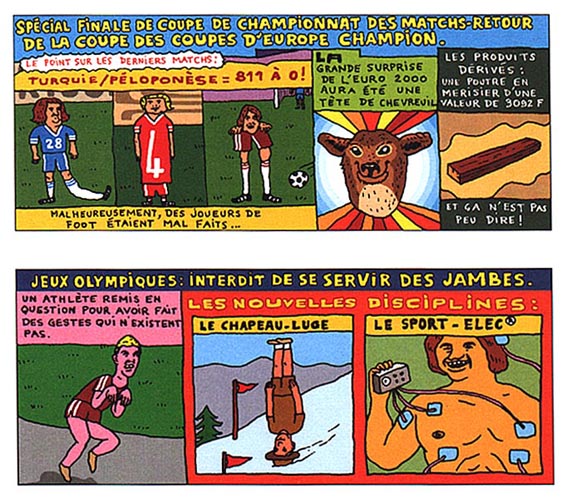I am a huge fan of french comic writer Pierre la Police. Fabrice Leroy happened to write an essay about it: « C'est tout mal fait, pardon »: The Rhetoric of Politics in Pierre La Police's Comics ("it's all badly done, sorry").
In a recently published article, Livio Belloï and I examined Pierre La Police's parody of media representation, his ironic stance toward mass culture in general, and his reflexive deconstruction of the comics medium, as a network of complex and consistent semiotic structures. At the encoding level, Pierre La Police highlights the systematic distortion and oversimplification of reality usually found in print and television news media, which tend to mythologize (in the Roland Barthes sense) their referent for public consumption. At the decoding level, he relies on his reader's awareness to gauge the ironic transformation of real people and events into nonsensical ones.
The article then explores syntactic and semantics constructions (discursive shortcut, lexical malapropisms , slang, adjectival misuse) that are at stakes in the comics. Reading La Police's stuff, I am always amazed by some of the structures like: " "Des chômeurs empêchent Lionel Jospin de prendre son bain, ils ont essayé de lui casser le magnétoscope mais l'armée il les a empêché" ("Jobless people prevent Lionel Jospin [france prime minister at that time to take a bath, they tried to break his VCR but the army he prevent them from doing that", with a mistake on purpose).
These morphosyntactic distortions ironically imply that the news tends to reduce political reality to an infantilized oversimplification, and that news consumers in return process information at a most simplistic, and sometimes ridiculously transformative level (as recent electoral campaigns proved to many observers).
About infantilization, Thomas Lélu is also doing good. Why do I blog this? I am very often intrigued by oversimplication and infantilization in media production, Pierre la Police nicely makes fun of this in today's world.
